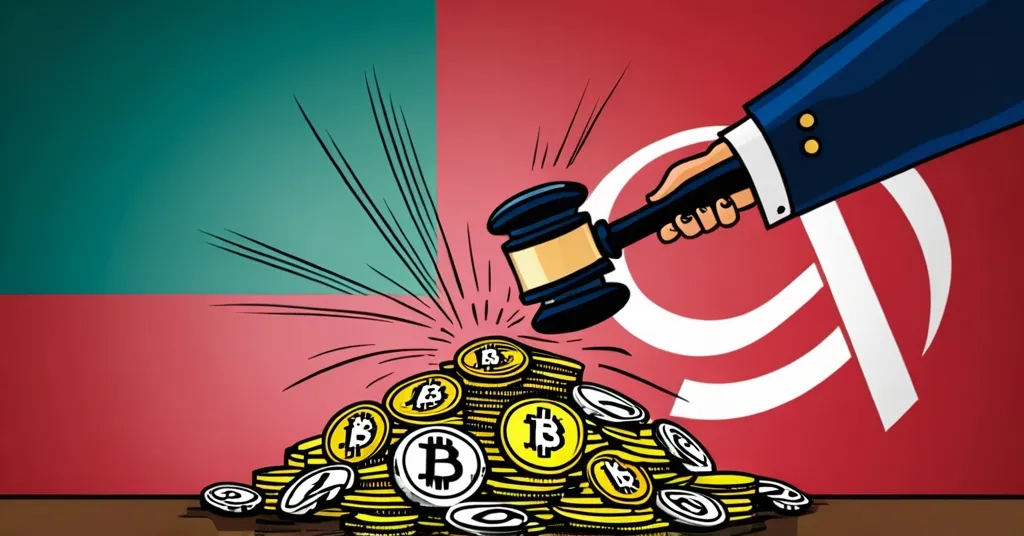Kazakhstan Jails Crypto Exchange Operators, Seizes $750K in Assets Amid Crackdown

Kazakhstan Court Jails Crypto Exchange Operators as Crackdown Intensifies
In a significant move, a court in Kazakhstan has sentenced three operators of an unlicensed cryptocurrency exchange to prison terms of 2.5 to 3.5 years, signaling the country’s ongoing efforts to regulate the crypto industry. This action comes as part of a broader crackdown on illegal crypto trading platforms, with the government seizing assets and targeting platforms involved in criminal activities.
- Three operators jailed for running an unlicensed crypto exchange
- $1.28 million in transactions processed; $750,000 in assets seized
- AIFC: the only legal hub for crypto exchanges in Kazakhstan
- AFM shuts down 19 illegal platforms in 2024
- Over 3,500 unlicensed exchanges blocked
- Part of global efforts to regulate cryptocurrencies
The trio convicted in Kazakhstan processed over $1.28 million in transactions for 380 customers. The authorities seized assets worth $750,000, which included real estate, five cars, a quad bike, and high-end computer equipment. This crackdown highlights the tangible consequences of operating outside the legal framework. An “unlicensed digital currency platform” is an online service that exchanges cryptocurrencies without government approval, often leading to risks for both operators and users.
Kazakhstan’s approach to cryptocurrency is straightforward: exchanges must operate within the Astana International Financial Center (AIFC). The AIFC is a special financial zone designed to attract international investment and regulate financial activities, including cryptocurrencies. It serves as the only legal playground for crypto exchanges in the country. International giants like Binance and Bybit have navigated these waters successfully, obtaining the necessary permits to operate within this framework.
The Financial Monitoring Agency (AFM) has been relentless in its mission to clean up the crypto scene. In the first nine months of 2024 alone, the AFM shut down 19 illegal platforms with a total turnover of $60 million. These platforms were linked to criminal activities, including a staggering $18.8 million in drug-related money laundering. Moreover, the AFM has blocked access to over 3,500 unlicensed crypto exchanges, targeting not just illegal exchanges but also crypto mining and transactions.
This crackdown isn’t just a local affair; it’s part of a global narrative where governments are grappling with the unregulated space of cryptocurrencies. Kazakhstan’s actions reflect a broader effort to bring the crypto industry under regulatory oversight, aligning with international standards to combat financial crimes and ensure market stability. While the crackdown poses challenges, it also pushes the industry towards more transparent and secure operations.
Yet, the situation raises questions about the future of decentralized finance in regions with stringent regulations. For proponents of Bitcoin and blockchain technology, who champion decentralization, freedom, and privacy, this crackdown is a hurdle in the race towards a more decentralized world. However, it’s worth noting that while Bitcoin remains at the forefront of the crypto revolution, other blockchains and protocols like Ethereum also play crucial roles in filling niches that Bitcoin might not serve well.
On the flip side, some argue that such stringent regulations could stifle innovation and infringe on personal privacy. While Kazakhstan’s approach aims to curb illegal activities, it’s essential to consider the potential chilling effect on the crypto ecosystem. Could this lead to a more centralized control over what was meant to be a decentralized system? It’s a delicate balance between fostering a safe environment and allowing the disruptive potential of cryptocurrencies to flourish.
Looking forward, Kazakhstan’s crypto landscape is likely to evolve. The AIFC stands as a beacon for legal operations, but the path is fraught with challenges for those who dare to venture outside its boundaries. As the country continues its regulatory push, it will be crucial to monitor how these developments impact the broader crypto community, both locally and globally.
The trio reportedly used ‘unsecured digital assets,’ operated crypto wallets, and ‘used funds received from crypto exchanges whose activities are prohibited in Kazakhstan.’
Per AFM figures, criminals used illegal exchange platforms to process $18.8 million worth of drug-related money in 2024.
Kazakhstan’s campaign against illegal crypto exchanges began to gather pace early last year.
Key Questions and Takeaways
What led to the imprisonment of the crypto exchange operators in Kazakhstan?
The operators were jailed for running an unlicensed crypto exchange, processing over $1.28 million in transactions, and using funds from prohibited exchanges.
What assets were seized from the operators?
Assets seized included real estate, five cars, a quad bike, and expensive computer equipment, totaling $750,000 in value.
What is the Astana International Financial Center (AIFC), and why is it significant for crypto exchanges in Kazakhstan?
The AIFC is a financial hub in Kazakhstan where crypto exchanges are required to operate to be considered legal. It’s significant because it represents the government’s controlled environment for the crypto industry.
How is the Kazakh government addressing illegal crypto activities?
The government is intensifying its crackdown, closing down illegal platforms, blocking access to unlicensed exchanges, and targeting activities linked to criminal behavior, such as drug-related money laundering.
What international crypto exchanges have successfully obtained permits in Kazakhstan?
Binance and Bybit are mentioned as having successfully obtained permits to operate within the AIFC.
What is the broader context of Kazakhstan’s actions against illegal crypto exchanges?
Kazakhstan’s actions are part of a global trend where governments seek to regulate cryptocurrencies to combat financial crimes and ensure market stability, reflecting a balance between fostering industry growth and controlling illicit activities.



